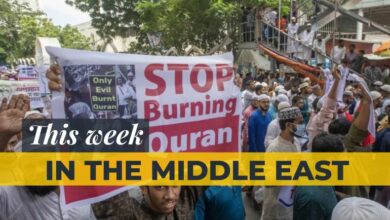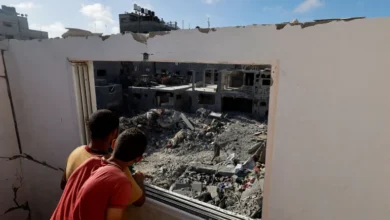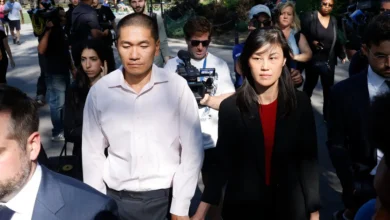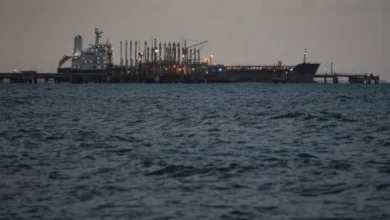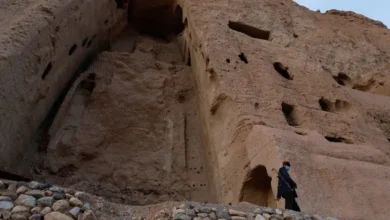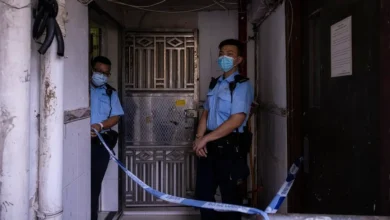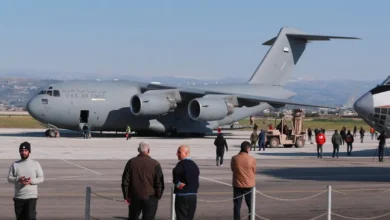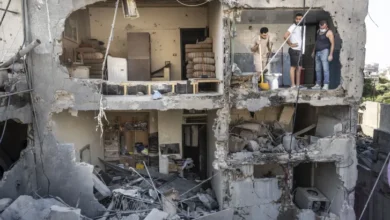Jordan recalls envoy to Israel, Jabalia struck again
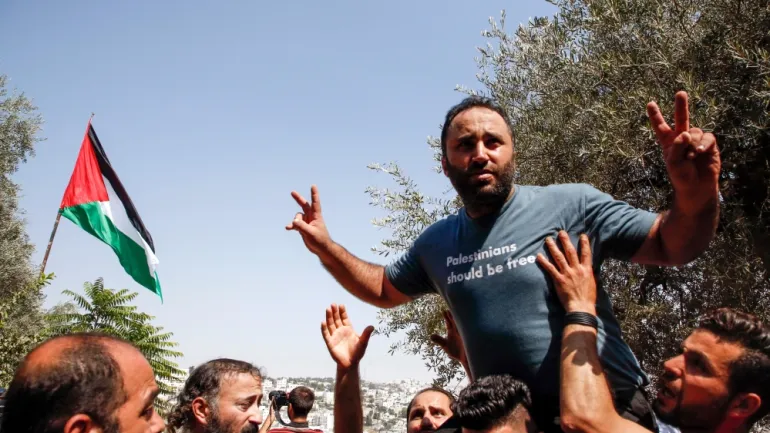
- Jordan says it is recalling its ambassador to Israel over the war in Gaza.
- Gaza’s Jabalia refugee camp is struck again, a day after Israeli air attack killed dozens and sparked widespread condemnation.
Gaza’s al-Shifa Hospital ‘full, overpacked’, director says
The latest “massacre” on a bakery near Gaza’s al-Shifa Hospital has left several killed and has overwhelmed the facility, the hospital’s director says.
People “lining up to get their hands on a loaf of bread were shelled, torn to pieces, dozens killed, dozens injured, all innocent civilians”, Mohammed Abu Salimi told Al Jazeera.
“Yesterday, hundreds killed in Jabalia, today in Gaza bakery, it is premeditated murder,” he said.
“Women, children, innocent, unarmed civilians lining up … killed indiscriminately.”
Abu Salimi added that the intensive care and emergency units at al-Shifa are full.
“Every single bed is full. We are overpacked, we’re running out of medicine, we’re running out of medical supplies,” he said.
Al Jazeera’s Youmna ElSayed, reporting from Gaza, said that the bakery is “less than a kilometre” from the hospital. There are only “a few bakeries left in Gaza,” she added. “Most bakeries have either been targeted or destroyed” in Israeli air raids.
High-ranking US State Dept official heads to Israel ahead of Blinken visit
Derek Chollet, who serves as an adviser and consultant to top US diplomat Antony Blinken, is travelling to Israel “to reaffirm the United States’ commitment to stand in solidarity with Israel and support its right to defend itself, consistent with international humanitarian law”, the State Department says.
Chollet will then continue on to Jordan and Turkey to “continue our work to prevent the conflict from spreading to other parts of the region”, help secure the release of captives held in Gaza, and help to assist US citizens, according to the department.
The trip comes before Blinken is set to arrive in Israel on Friday.
UN Middle East envoy says ‘we need to build on’ opening of Rafah border crossing
Tor Wennesland has welcomed the opening of the Rafah border crossing for dozens of wounded Palestinians and another 335 foreign passport holders, calling it an “important step in the right direction”.
In a post on X, the UN Middle East envoy said the move is something “we need to build on”.
Wennesland went to to applaud Egyptian and US efforts and recognised their “active engagement” with the UN.
Situation in occupied West Bank ‘very hard’: Hebron-based activist
Issa Amro, a prominent human rights activist based in Hebron, says the security situation in the occupied West Bank has become “very hard” since the war broke out.
“I can see soldiers in the streets, in the fields, around houses. It’s maybe double the amount than before,” Amro, 43, told Al Jazeera. “All the checkpoints are closed. Israeli settlers and soldiers are acting violently with the Palestinians.”
Seized by Israel in 1967, Hebron is split into two sectors: H1, which is under the jurisdiction of the Palestinian Authority, and H2, under Israeli administration, in accordance with the 1997 Hebron Agreement.
About 200,000 Palestinians reside on both sides. A few hundred Israeli settlers live in H2 under the heavy protection of Israeli troops.
“The Palestinians who are living in H2 area of Hebron have been under curfew since October 7,” Amro said, referring to the day Hamas launched its surprise attack inside Israel. “They give them one hour every two days to get food.”
Amro also said that many settlers have been wearing army uniforms and behaving in a “very fanatical and extreme way”.
“They go to the homes of Palestinians to scare them, intimidate them. They tell them they will kill them if they stay in their homes. Only a few families are left because they are afraid to stay,” he said, adding that he was picked up by Israeli forces on October 7 and held for some 10 hours, during which he alleged being beaten and tortured.
Amnesty calls for arms embargo on ‘all parties in the conflict’
The rights organisation called on trade groups to follow the lead of the Belgian Transport Workers’ Unions, which has called on its members to refuse to handle military equipment being sent to Israel amid the war.
“Others should follow suit!” Amnesty said in a post on X, calling for “an arms embargo on all parties to the conflict”.
The US remains far and away the largest exporter of arms to Israel, followed by Germany, according to the Stockholm International Peace and Research Institute.
The Biden administration has promised to continue to send weapons and military assistance to Israel amid the war. It is currently requesting about $14bn in additional military aid to Israel from the US Congress.


